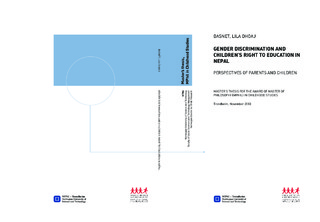Gender discrimination and children's right to education in Nepal: Perspectives of parents and children
Master thesis
Permanent lenke
http://hdl.handle.net/11250/269118Utgivelsesdato
2013Metadata
Vis full innførselSamlinger
Sammendrag
Gender discrimination is considered as problematic issues for promoting equality and attainment of universal rights of children especially, in south Asia. In Nepal, where a patriarchal system of social relations predominates, parental preference inclines to the male child and is reflected in the socio-cultural practices, status and economic potentiality associated. Yet, such preference tends to negatively influence the girls' educational right, welfare, health and survival opportunities. This study focuses on how boys and girls receive different allocation of resources within the family based on existing socio-cultural practices in Sarlahi district. It explores the impact of prevailing cultural values and gender discourses in schooling of children together with intra-household resource allocation from children’s and adult’s perspectives. Furthermore, the study examines the implications of the socio-cultural perspective of child work combined with schooling in the rural parts of Nepal. The study is drawn on the theoretical perspectives of the new social studies of children and childhood viewing children as independent, competent social actors having their own rights and perspectives. Qualitative fieldwork was carried out among the children of diverse socioeconomic backgrounds involving multiple methods of data collection: observation, interview, essay writing and focus group discussion. Research participants primarily included 20 children (10 boys and 10 girls) of 12-16 years age. In addition, 5 parents and 5 teachers between 37-52 years old were also included as adult participants. The empirical materials were analyzed qualitatively. The study found out that young girls were more disadvantaged in comparison to their male counterparts. These disadvantages encompass all aspects of their life including intra-household resource distribution in terms of health and nutrition, pocket money, play and entertainment. However, the study also reveals that girl’s rather inferior position in resource allocation is shaped by such factors as age, and birth order within siblings. With reference to schooling, young girls were mainly discriminated against quality of education. It means all the children (both boys and girls) attended school but the discrimination was magnified in terms school they enrolled and the quality of education they received. Boys attend boarding schools that of superior quality than the government schools, where most girls were enrolled. Parental education and attitudes had negative impact on girls schooling. Gender discrimination against girls in schooling was mainly affected by the sociocultural factors such as pro-male bias, household work burden, unequal access and expected returns in the labor market, educational costs, accessibility and proximity to the school and religious factors. Yet, children continue to make significant contribution in the family livelihoods with routine and non-routine forms of household tasks beside their schooling activities.
